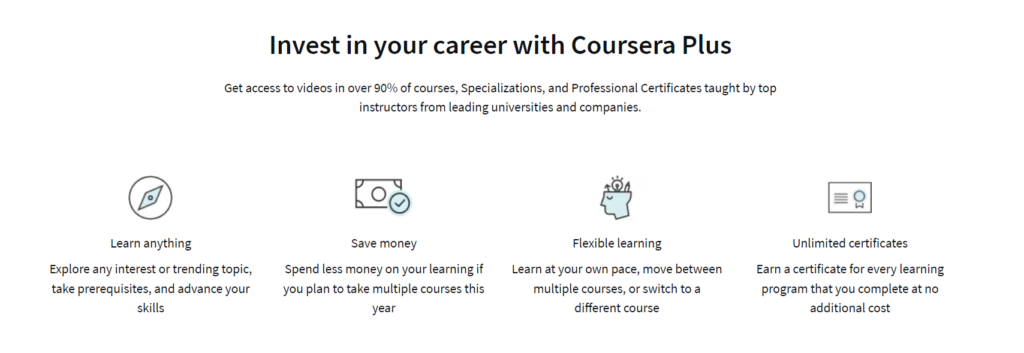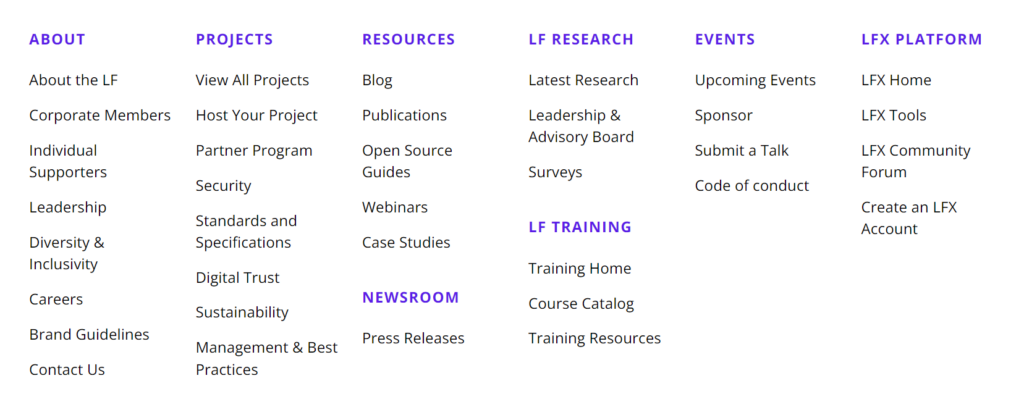Introduction
The Linux Foundation and Coursera are two leading names in the realm of online education, each offering distinct pathways to knowledge and skill-building in the tech industry. While they both aim to empower learners with valuable skills, their focus, content delivery methods, and target audiences vary significantly.
The Linux Foundation is a nonprofit organization established in 2000, dedicated to promoting and advancing the Linux operating system and open-source software development. It has since expanded its reach to offer specialized training and certifications in key open-source technologies, including Linux, Kubernetes, blockchain, cloud computing, and more.
The courses provided by the Linux Foundation are meticulously designed by industry experts and open-source project maintainers, ensuring that learners receive up-to-date and relevant training. Its programs are particularly aimed at IT professionals who want to deepen their expertise in open-source technology and secure industry-recognized certifications to boost their careers.
On the other hand, Coursera is an online learning platform founded in 2012 with the vision of providing universal access to world-class education. Unlike the Linux Foundation’s narrow focus on open-source technologies, Coursera offers a broad spectrum of courses across various fields, including computer science, data science, business, arts, and personal development.
The platform collaborates with leading universities and companies, such as Stanford University, Google, and IBM, to deliver high-quality content in the form of individual courses, Specializations, Professional Certificates, and even full online degree programs. Coursera caters to a diverse audience, from beginners seeking foundational knowledge to advanced learners and professionals aiming to upskill or reskill in different domains.
The choice between these two platforms largely depends on a learner’s career goals and educational needs. The Linux Foundation is the go-to option for individuals looking for in-depth, hands-on training in open-source software with a strong emphasis on practical skills and industry-recognized certifications.
Conversely, Coursera serves a wider audience by providing a more comprehensive range of subjects and learning paths, making it suitable for anyone interested in a flexible and diverse online education experience. This introduction sets the stage for a deeper comparison of their offerings, including features, pricing, and the unique benefits each platform brings to the table.
Overview of Linux Foundation and Coursera
Linux Foundation Overview
The Linux Foundation is a nonprofit organization established in 2000 with the primary mission to foster the growth of Linux and other open-source technologies. Over the years, it has evolved into a key player in the tech education landscape, offering specialized training and certification programs for individuals and organizations that are involved in open-source software development. Its focus areas include Linux system administration, Kubernetes, cloud computing, blockchain, DevOps, and more.

The Linux Foundation is known for its highly targeted and industry-relevant training programs, developed in collaboration with leading experts and maintainers of open-source projects. The content is designed to meet the needs of professionals who are looking to acquire practical skills and hands-on experience in open-source technologies.
It offers certifications like the Linux Foundation Certified Engineer (LFCE) and the Certified Kubernetes Administrator (CKA), which are well-recognized and valued by employers in the IT industry. The training programs typically include hands-on labs and exercises to provide learners with a real-world experience, ensuring they can apply their knowledge directly in professional environments.
Coursera Overview
Coursera, founded in 2012, is one of the largest and most diverse online learning platforms, offering a wide range of courses across multiple disciplines. Unlike the Linux Foundation’s specialized focus, Coursera provides courses in areas such as computer science, data science, business, arts, humanities, and personal development. The platform partners with top universities and companies worldwide, including Stanford, Yale, Google, and IBM, to bring high-quality, expert-led courses to a global audience.

Coursera’s approach to learning is versatile and flexible, providing various types of programs to cater to different learning needs and preferences. These include individual courses, Specializations (a series of related courses that build specific skills), Professional Certificates, and even full online degrees.
Coursera’s courses are designed to be accessible to a broad audience, from beginners to advanced learners, with options to audit courses for free or enroll in paid programs to receive certificates. The platform’s interactive learning environment often includes video lectures, quizzes, peer-reviewed assignments, and community forums, offering a comprehensive and engaging learning experience.
Key Differences
- Focus and Specialization: The Linux Foundation is highly specialized in open-source technologies, with a curriculum designed for IT professionals seeking deep technical knowledge and industry-recognized certifications. Coursera, however, provides a broad catalog of courses spanning multiple domains, appealing to a wider audience.
- Course Development: Linux Foundation courses are developed and delivered by experts in open-source communities, often including the creators or maintainers of key projects. Coursera collaborates with prestigious universities and leading companies to offer its diverse course content.
- Learning Pathways: The Linux Foundation focuses on hands-on training and certifications that directly apply to open-source software roles. In contrast, Coursera offers varied learning pathways, including standalone courses, Specializations, and full degree programs, making it suitable for learners at different stages and with diverse goals.
- Target Audience: The Linux Foundation primarily targets IT professionals and developers seeking to specialize in open-source technologies. Coursera’s target audience is broader, encompassing anyone interested in learning, from students to working professionals in various fields.
This overview highlights the core offerings and distinctions of the Linux Foundation and Coursera, setting the stage for learners to evaluate which platform aligns best with their educational and career objectives.
Features
Linux Foundation Features
- Specialized Training: Offers highly specialized courses in open-source technologies such as Linux, Kubernetes, Cloud Foundry, and Hyperledger.
- Industry-Relevant Certifications: Provides certifications like Certified Kubernetes Administrator (CKA) and Linux Foundation Certified Engineer (LFCE), which are recognized and valued in the IT industry.
- Hands-On Labs: Many courses include hands-on labs to give learners practical experience, a crucial element for technical skill development.
- Expert-Led: Courses are often developed and delivered by industry experts and maintainers of key open-source projects.
- Flexible Learning: Self-paced learning options allow learners to study at their convenience, which is beneficial for working professionals.

Coursera Features
- Diverse Course Catalog: Offers a broad range of courses across different fields, including computer science, data science, business, personal development, and more.
- Collaborations with Leading Institutions: Partners with top universities like Stanford, MIT, and companies like Google and IBM to provide high-quality content.
- Flexible Learning Paths: Offers various learning paths like individual courses, Specializations, Professional Certificates, and full online degrees.
- Interactive Learning: Includes video lectures, quizzes, and peer-graded assignments to enhance learning.
- Accredited Certificates: Many courses offer certificates upon completion, which can be valuable for career advancement. Some courses also contribute credits toward a degree.

Pricing
Linux Foundation Pricing
- Course Fees: The cost of individual courses ranges from $100 to $600, depending on the complexity and depth of the material. For example, the “Linux System Administration Essentials” course costs around $299, while the “Certified Kubernetes Administrator” course is priced at $575.
- Certification Fees: Certification exams are typically priced separately, ranging from $300 to $400.
- Bundles and Membership: The Linux Foundation offers bundles that combine training and certification at a discounted rate. Additionally, membership options for organizations provide broader access to training resources.

Coursera Pricing
- Individual Courses: Prices range from free (audit-only access) to $100-$300 for individual courses. The price depends on the course duration and content.
- Specializations and Certificates: Monthly subscription plans for Specializations and Professional Certificates range from $39 to $79 per month.
- Degree Programs: Online degree programs, such as Master’s degrees, are more expensive, typically ranging from $15,000 to $25,000, payable in installments.
- Coursera Plus: An annual subscription of $399, providing unlimited access to a wide range of courses and Specializations.

FAQs
Are Linux Foundation certifications recognized in the industry?
Yes, Linux Foundation certifications are highly regarded, particularly in the open-source and cloud computing sectors.
Can I access Linux Foundation courses for free?
Most courses are not free; however, the Linux Foundation occasionally offers free training materials or scholarships for specific courses.
What is the validity of Linux Foundation certifications?
Certifications are typically valid for two to three years, after which professionals may need to recertify to maintain their credentials.
Can I access Coursera courses for free?
Yes, many Coursera courses offer free access to course materials through the audit option. However, you will not receive a certificate unless you pay for the course.
What types of certificates does Coursera offer?
Coursera offers Certificates of Completion, Professional Certificates, and even accredited degrees in partnership with universities.
Can I get financial aid for Coursera courses?
Yes, Coursera provides financial aid for those who cannot afford the course fees. Applicants need to fill out a form and receive approval before accessing the course.
Conclusion
The Linux Foundation and Coursera serve different educational needs in the tech world. The Linux Foundation is ideal for professionals seeking in-depth, hands-on training and certifications in open-source technologies. It offers a focused curriculum that is directly applicable to IT roles, particularly in system administration, cloud computing, and blockchain.
On the other hand, Coursera provides a more diverse range of learning opportunities, including computer science, data science, business, and even full degree programs. Its collaboration with renowned universities and corporations makes it a versatile platform for both beginners and advanced learners across various domains.
Choosing between the two depends on your career goals. If you’re aiming for a niche specialization in open-source software and want to gain industry-recognized certifications, the Linux Foundation is the way to go. However, if you’re looking for a broader educational platform that covers multiple fields and offers flexibility in learning paths, Coursera may be the better choice.


